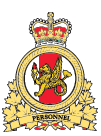Valour
 This information has been archived for reference or research purposes.
This information has been archived for reference or research purposes.
Archived Content
Information identified as archived on the Web is for reference, research or recordkeeping purposes. It has not been altered or updated after the date of archiving. Web pages that are archived on the Web are not subject to the Government of Canada Web Standards. As per the Communications Policy of the Government of Canada, you can request alternate formats on the "Contact Us" page.
Here in Kingston, Ontario, yet another autumn is upon us. Those chilly ‘westerlies’ are starting to blow after a particularly warm and tempestuous summer in the Great White North. However, we sincerely hope that, in spite of dealing with bouts of heat prostration, we have managed to cobble together an issue that will both interest and inform our readership.
At this time, it gives me great pleasure to introduce Claire Chartrand as the Journal’s new Publication Manager. Claire comes to us directly from the Commander’s suite at the Canadian Defence Academy Headquarters, where she ably served as Executive Assistant to the Commander for four full years. Highly skilled and full of boundless enthusiasm, Claire has taken to the new position like the proverbial ‘duck to water,’ and she has already established herself as a valuable member of our miniscule CMJ team. A warm welcome, Claire!
On to the current issue…The timely and appropriate evaluation and appraisal of a Member’s performance and potential is an extremely important aspect of military life. In our lead article, Navy lawyer Mike Madden examines the current alternative dispute resolution (ADR) process for resolving Performance Evaluation Report (PER) grievances within the Canadian Forces, assesses its effectiveness, and offers suggestions as to how the system could be improved.
Mike is followed by a young, scholarly voice from the CF intelligence community. Lieutenant Nick Deshpande considers seven global dynamics, including declining American power, cyber warfare, environmental degradation, and rising energy consumption, all significant challenges in their own right, which, he believes, “… will have a significant upon Canada and its military’s role in the world.” Next, another young intelligence officer, Captain Levon Bond, takes a fresh look at Intelligence, Surveillance, and Reconnaissance (ISR) capabilities in Canada’s Arctic. In particular, Bond examines the Polar Epsilon program and the JUSTAS project, and makes a case for employing layered and integrated ISR through the expansion and merging of these two initiatives.
In an article that bridges historical and present-day issues, Major Jim McKillip, an historian at the Directorate of History and Heritage in Ottawa, examines the UN intervention in the Congo from 1960 to 1964, and the ongoing violence in the area. In McKillip’s words: “The long and unfortunate record of international involvement in the Congo remains a troubling legacy for Western decision-makers to this day.”
Our historical section contains two articles pertaining to Canadian military history. In the first, Ottawa scholar Galen Perras examines the historiography associated with the tragic fall of Hong Kong to Japanese forces in December 1941, Herein, Perras maintains, “ … [that] we still need a monograph that avoids nationalist ‘finger-pointing and grudge settling,’ is interpretatively innovating, and mines multinational archival sources.” In the second article, Canadian Forces College scholars Jérôme Lacroix-Leclair and Eric Ouellet examine the nature of irregular warfare, the so-called Petite Guerre, as it was practiced in New France from 1660 to 1759. In particular, and as a current linkage, they examine the ongoing reality “… [that] irregular conflicts are implicitly perceived by regular armed forces as illegitimate, and that it is therefore difficult for regular forces to adapt to them.”
In our Views and Opinions section, award-winning communications practitioner and former serving officer Tim Dunne makes a very strong advocacy case for the acquisition of the Lockheed Martin F-35 Lightning II as Canada’s next fighter aircraft, while Chief Warrant Officer Rob Unger of the Black Watch (The Royal Highland Regiment of Canada) advances a compelling argument as to why Primary Reservists should be financially compensated on a par with their Regular Force compatriots for equivalent service rendered. Our own Martin Shadwick then takes a retrospective look at how defence policy issues factored into the recent 2011 federal election. Finally, we close with the usual potpourri of book reviews for our readership’s consideration.
On a personal note, I am delighted that the two recent articles dealing with the ethics and the legality of battlefield mercy killings, by Dr. Peter Bradley and Lieutenant-Colonel Michel Reid respectively, have generated so much interest. In fact, very senior and respected Allied military educational institutions have specifically asked for the Journal’s permission to use these two articles as case studies for their future Flag officers under training. More to follow on this timely and important subject in the next issue…
Until the next time.
David L. Bashow
Editor-in-Chief
Canadian Military Journal






